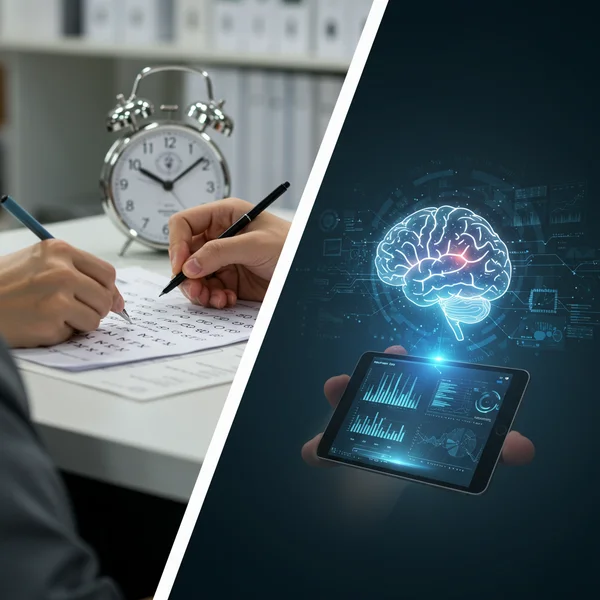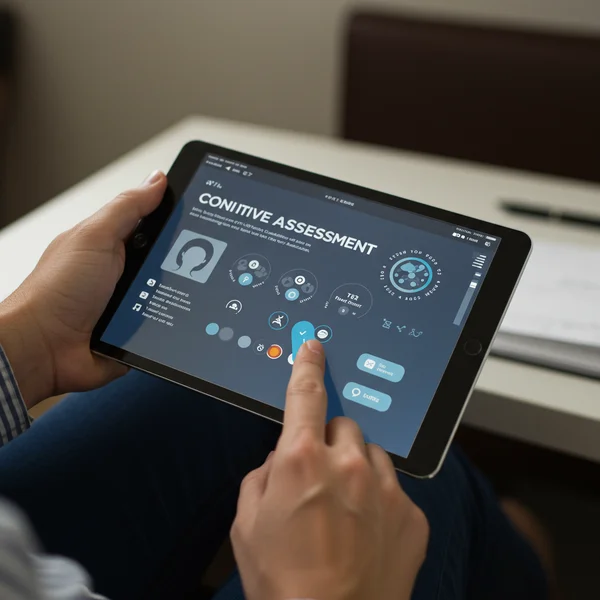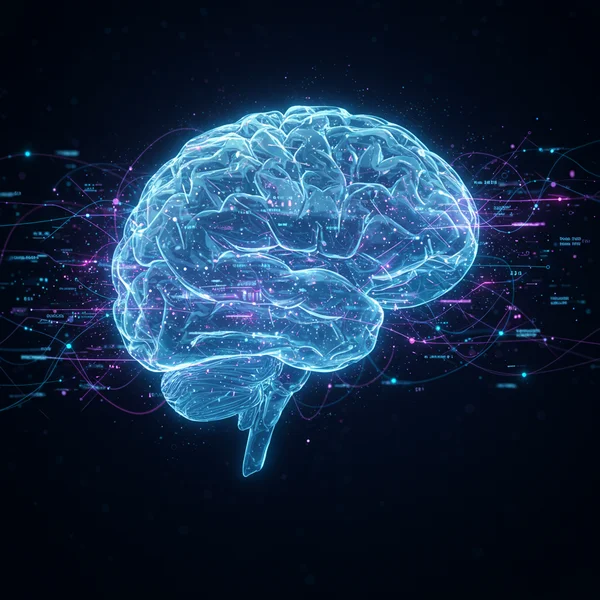AI vs. Traditional Cognitive Assessments: For Professionals
September 29, 2025 | By Gideon Albright
The landscape of cognitive assessment is rapidly evolving, driven by technological advancements that are reshaping how we measure and understand the human mind. For professionals—clinicians, researchers, and educators—selecting the most effective and precise tools is paramount for delivering quality care, conducting valid research, and creating impactful educational strategies. The central question remains: Why would someone need a cognitive assessment? Whether for baseline measurement, monitoring change, or identifying specific challenges, the goal is always clarity and precision. This guide compares traditional, often paper-based, cognitive assessment methods with cutting-edge AI-driven solutions, offering insights into how AI is transforming accuracy, efficiency, and data analysis in professional settings. Explore how our AI-powered platform is setting a new standard.

Understanding Traditional Cognitive Assessment Tools
For decades, the standard for evaluating cognitive function has been a set of well-established, manually administered tests. These tools have been foundational in neurology, psychology, and geriatrics, providing a structured way to screen for cognitive impairment and track changes over time. They represent the bedrock upon which modern cognitive science was built.
Common Paper-Based Assessments (e.g., MoCA, MMSE)
Professionals are intimately familiar with instruments like the Montreal Cognitive Assessment (MoCA) and the Mini-Mental State Examination (MMSE). These tests typically involve a series of questions and simple tasks administered by a practitioner to assess various domains, including memory, attention, language, and visuospatial skills. They are valued for their standardized questions and established scoring rubrics, providing a consistent framework that has been validated by decades of research and clinical use. Their familiarity and low-tech nature make them accessible in almost any clinical setting.

Strengths and Inherent Limitations of Conventional Methods
The primary strength of these conventional methods lies in their extensive validation and widespread acceptance within the medical and scientific communities. However, from a data and technology perspective, their limitations are significant. The scoring process, while guided by rubrics, can introduce inter-rater variability and subtle subjectivity. A tired administrator might score differently than a fresh one. Furthermore, these tests capture only a final outcome—a correct or incorrect answer—missing the rich data hidden in the process, such as response time, hesitation, and correction patterns. They are also time- and labor-intensive, requiring one-on-one administration and manual scoring, which can create bottlenecks in busy professional workflows.
The Evolution: Digital Cognitive Testing Platforms
The first evolutionary leap from paper-and-pencil tests was the move to digital platforms. This transition involved converting traditional assessments into a computerized format, allowing for automated administration and scoring. This step was crucial in addressing some of the logistical challenges of manual testing.
Enhancing Accessibility and Standardization in Assessment
Digital platforms immediately improved standardization by ensuring every user received the exact same instructions and stimuli. They eliminated scoring errors and made it possible to administer tests to larger groups simultaneously, enhancing accessibility for research and large-scale screenings. The data became easier to collect, store, and aggregate, streamlining the administrative side of cognitive assessment and allowing professionals to focus more on interpretation and care.

Initial Advantages Over Paper-Based Approaches
Beyond standardization, early digital tests introduced the ability to capture basic metrics like overall completion time. This was a significant step forward, offering an additional data point that paper-based tests could not reliably provide. The automation of scoring also saved considerable time, freeing up valuable professional resources. However, most of these initial platforms were simply digital copies of their analog predecessors; they didn't fundamentally change how performance was analyzed. They made the process more efficient but not necessarily more insightful.
Unleashing Precision with AI Cognitive Assessment
The true revolution in cognitive testing is not just digital administration but the integration of artificial intelligence into the analysis itself. An AI cognitive assessment goes beyond simple right-or-wrong scoring to analyze the subtle complexities of human performance, unlocking a level of detail previously unattainable. This is where modern platforms, like the online cognitive assessment, truly differentiate themselves.
Unparalleled Accuracy: Going Beyond Human Observation
AI algorithms can analyze thousands of data points from a single assessment session. They measure minute variations in response times, track cursor movements, identify patterns of hesitation, and learn an individual's unique cognitive signature. This granular level of analysis minimizes the subjectivity inherent in human observation and provides an objective, data-driven picture of cognitive function. By processing these complex patterns, AI can detect subtle signs of cognitive change that might be missed by traditional scoring methods.

Efficiency in Data Analysis and Comprehensive Reporting
For busy professionals, time is a critical resource. An AI engine automates the entire analysis process, transforming raw performance data into a comprehensive report in seconds. Instead of spending hours scoring tests and compiling results, you receive an instant, detailed breakdown of cognitive strengths and weaknesses. This report can highlight not just what domains are challenged, but how they are challenged, providing a much richer context for clinical interpretation or research analysis.
Personalized Insights and Actionable Recommendations
Perhaps the most powerful feature of an AI cognitive assessment is its ability to generate personalized insights. By comparing an individual's performance patterns against a vast, anonymized dataset, the AI can identify unique cognitive profiles and offer tailored, actionable recommendations. This moves the assessment from a simple measurement tool to a strategic guide for improvement. For professionals, this means you can provide clients, patients, or students with clear, data-backed next steps. You can discover the benefits of this approach for your own practice.
Strategic Considerations for Clinical Assessment Tools
Adopting any new technology into a professional practice requires careful consideration of its practical and ethical implications. The transition to AI-powered clinical assessment tools is no different, with data security, workflow integration, and responsible use being top priorities.
Data Security and Patient Confidentiality in Digital Platforms
Patient and user data must be protected with the highest standards of security. Leading platforms are built with privacy at their core, utilizing advanced encryption and data anonymization techniques to ensure all information is handled securely and confidentially. For any professional, verifying that a tool is compliant with privacy regulations like HIPAA or GDPR is a non-negotiable first step. Trust is the foundation of any clinical or research relationship.
Seamless Integration into Professional Workflows
A tool is only effective if it can be easily integrated into existing workflows. Modern AI assessment platforms are designed to be intuitive and user-friendly, requiring minimal training to operate. Results are delivered in clear, easily shareable formats that can be added to patient files, research databases, or educational plans. The goal is to augment professional judgment with powerful data, not to create additional administrative burdens. A well-designed tool should feel like a natural extension of your practice.
Ethical Use and Responsible AI in Cognitive Health
It is crucial to remember that an AI assessment is a powerful data-gathering tool, not a diagnostic replacement for professional expertise. The ethical use of this technology involves understanding its capabilities and its limitations. Reputable platforms will always be transparent about this, positioning their tool as a resource to support, inform, and enhance—not replace—the clinician's judgment. Responsible AI in cognitive health means empowering professionals with better data to make more informed decisions.
Embracing AI: The Future of Professional Cognitive Assessment
The shift from traditional paper-based tests to AI-driven platforms represents a fundamental leap forward in the field of cognitive assessment. While conventional methods laid an essential foundation, they are limited by subjectivity, inefficiency, and a surface-level analysis of performance. AI-powered tools overcome these challenges by delivering unparalleled accuracy, deep analytical insights, and automated, comprehensive reporting.
For clinicians, researchers, and educators, this technology offers a more efficient, objective, and powerful way to understand cognitive function. It allows you to move beyond simple scores to uncover the nuanced patterns that define an individual's cognitive profile. By embracing this evolution, you can enhance the quality of your work and provide better outcomes for those you serve. We invite you to explore the next generation of cognitive evaluation and start your assessment to see the difference firsthand.

Frequently Asked Questions for Cognitive Assessments**
What are 4 common cognitive assessment tools?
Four common cognitive assessment tools include the Mini-Mental State Examination (MMSE), a widely used screening for dementia; the Montreal Cognitive Assessment (MoCA), which is sensitive to mild cognitive impairment; the Wechsler Adult Intelligence Scale (WAIS), a comprehensive IQ test; and the Trail Making Test, which assesses executive function. Modern AI-driven platforms represent a new category, integrating principles from various tests into a more dynamic and data-rich format.
Why would someone need a cognitive assessment?
A person might need a cognitive assessment for several reasons: to establish a baseline of their cognitive function, to investigate concerns about memory or attention, to monitor the progression of a known condition, to assess cognitive abilities for a specific job, or simply to understand their cognitive strengths and weaknesses for self-improvement. It provides objective data to guide personal, clinical, or educational decisions.
Can a GP do a cognitive assessment?
Yes, a General Practitioner (GP) can and often does conduct initial cognitive screenings using tools like the MMSE or MoCA, especially when a patient expresses concerns about memory loss. However, for a more comprehensive evaluation, they will typically refer the patient to a specialist, such as a neurologist or neuropsychologist. Online tools like our comprehensive test can serve as a valuable first step to gather detailed information before a clinical visit.
How do you tell if you have cognitive decline?
Signs of potential cognitive decline can include increased difficulty with memory (e.g., forgetting recent events or appointments), trouble concentrating or making decisions, challenges with familiar tasks like managing finances, and getting lost in familiar places. While occasional forgetfulness is normal, a consistent pattern of these issues warrants a conversation with a healthcare professional and a formal cognitive assessment.
What are the next steps after a cognitive assessment?
The next steps depend on the results and the reason for the assessment. The report may highlight areas of strength and areas that need attention. If the assessment was for self-improvement, the next step might be implementing lifestyle changes or cognitive exercises. If it was part of a clinical evaluation, the results would be discussed with a healthcare provider to determine if further testing, monitoring, or intervention is needed.